The Umbrella Academy: Where do superheroes on screen go from here?
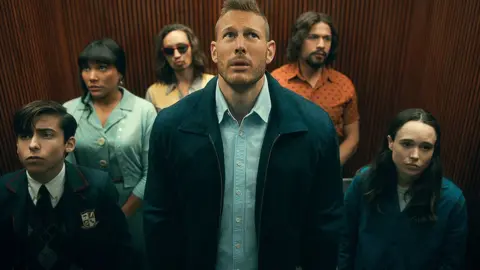 Netflix
NetflixYou're in skin-tight lycra leggings, with a pair of brightly coloured y-fronts pulled over the top, and (other than the chafing) there's only one thing on your mind - fighting crime.
Being a superhero used to be so simple, these days it's anything but.
Take the Netflix show The Umbrella Academy, the first series of which was watched by 45 million households. The show is more about a dysfunctional family wrestling with the effects of a cold and unloving father than about superhuman powers.
As British actor Tom Hopper puts it: "They're all fighting against their powers, really - they're all trying to just be human".
His character, Luther, is a human/ape hybrid with super strength who spent his formative years living on the moon, but he spends most of his screen time moping around because he's in love with his adopted sister.
It makes you wonder: Just how human can you make a superhero before they stop being, well, super?
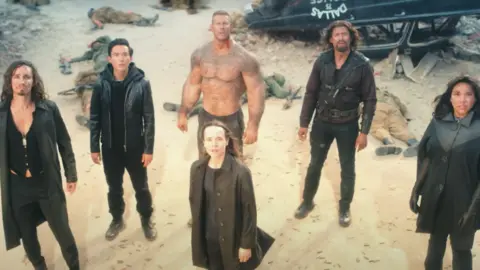 Netflix
Netflix"The characters represent a lot of people's issues in real life," Tom tells Radio 1 Newsbeat ahead of the release of the show's second series.
It sees the seven heroes accidentally stranded in 1960s Texas with only 10 days to stop a nuclear apocalypse.
Before they get to the small matter of saving the world, though, they've got to get to grips with a racist and homophobic society.
"There's a lot of people in certain demographics that have these struggles and we represent them and then, on top of that, we've got to think about being a superhero," Tom says.
"That's the problem in their life, their main issue is that they've got to be superheroes and that's why I fell in love with the script in the first place because, fundamentally, it's about them as people."
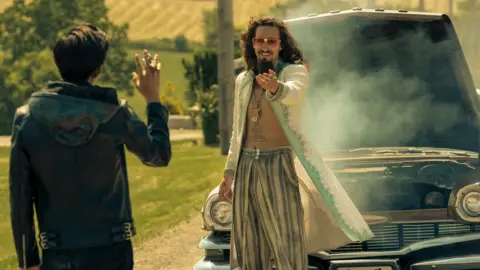 Netflix
NetflixPeople, though, as everyone knows, are complicated creatures.
Take Klaus - played by Irish actor Robert Sheehan. Blessed (or cursed?) with the ability to talk to the dead, he ends up using drink and drugs as a way of getting them to shut up.
"I suppose for each of the characters their superpower represents some some base level pain that they have to then deal with," Robert says.
"For Klaus, he's never been bothered to really deal with the source, so instead it's just easier to kind of throw drugs down on top.
"And that's a very human way of dealing with with a struggle."
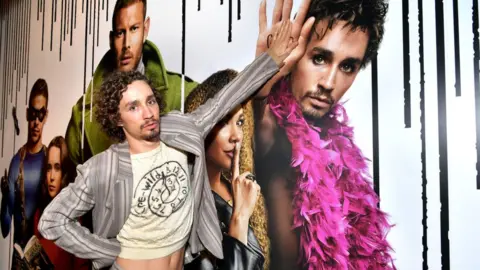 Getty Images
Getty ImagesEvery one of The Umbrella Academy's "base level pains" and "fundamental struggles", though, is balanced out by something completely bizarre; from talking monkeys and fish to what might be the greatest relationship between an old man and a shop mannequin ever committed to film.
It's based on graphic novels by My Chemical Romance frontman and self-confessed comic geek Gerard Way, and it owes a lot to classics like X-Men and The Watchmen.
Still - its significance to the genre as a whole could be huge. With massive viewer figures, it's arguably the most successful superhero franchise ever not to come out of Marvel or DC.
Tom, though, insists taking on the big boys isn't on their minds.
"I think that's probably part of the reason it works is that we don't see other superhero shows or movies as competition.
"We're just in our own little world and I think that's what is quite enjoyable about The Umbrella Academy family."
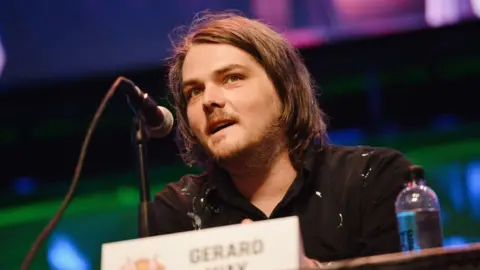 Getty Images
Getty ImagesBut, regardless of whether its cast like to think about the bigger picture or not, The Umbrella Academy has carved itself out a niche at what feels like a crucial time for the genre.
With Netflix losing the rights to broadcast Marvel content last year, there's an appetite for new comic book adaptations.
Then you've got Alan Moore, one of the most celebrated graphic novelists of all time, describing existing superhero culture as "tremendously embarrassing."
In short, it's a good time to be trying something new.
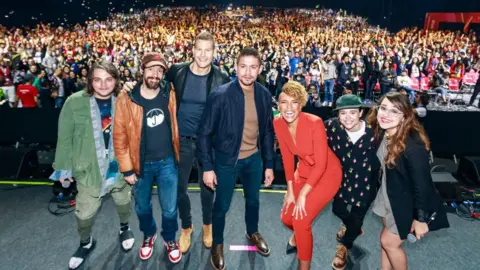 Getty Images
Getty Images"There seems to be something about the moment we're in that seems to be pushing superhero narratives to the fore again, as maybe we look for heroes to help us solve problems," says Rayna Denison, a senior lecturer in film, television and Media Studies at the University of East Anglia.
She specialises in superheroes and says The Umbrella Academy is one of the best TV adaptations of a comic she's seen in a while.
"I like how all of the superhero archetypes get stripped down and deconstructed and broken and then put back together, and I think that's also something we're interested in as a society is figuring out the human responses to what to do when heroes fall.
"We're getting serious social issues written into the characters now in ways that are creating a lot more diversity within superhero cultures, but also allowing superheroes to bear the burden of the difficult questions society is asking of itself.
"And I think that's really important because it means that media that were once meant for children are now very much aimed to all of us."
The Umbrella Academy season 2 launches on Netflix on 31 July.


